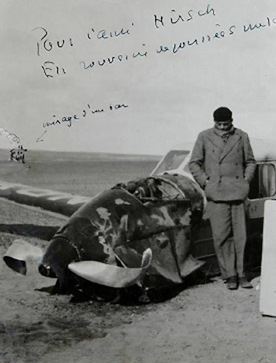Antoine Marie Jean-Baptiste Roger, comte de Saint Exupéry, to give him his full name, was a pioneering aviator as well as a writer and poet. After a career as a commercial pilot, helping to establish international airmail flights, he joined the French Air Force and later flew for the Free French Air Force despite being officially too old. His last mission was a reconnaissance flight in 1944, in the course of which he is assumed to have been shot down over the Mediterranean - he was never seen again.
 |
| Saint-Exupéry with the wreckage of his plane in the Sahara |
So why am I finding it so hard to write about? Partly because it's almost impossible to summarise - an airman crashes in the Sahara Desert, where he meets a Little Prince, a visitor from Asteroid B-612. The Little Prince asks him to draw him a sheep, tells him about his planet and his travels, and they become friends. The airman manages to fix his plane and find water just in time, and the Little Prince leaves after being bitten by a snake. It doesn't sound like much, and completely fails to do the book justice. It's one of those books like Jonathan Livingstone Seagull or The Alchemist that are as much about philosophy as anything else, and which many people find life-affirming, life-changing or whatever, and other people loathe with an equal passion... Added to that, there is the question of whether or not it's even a children's book in the first place. The author says that it is in his dedication, but plenty of people dispute that.
I had a copy as a child, but never read it - what happened to it eventually, I don't know. I later read it in French and completely failed to see what all the fuss was about.
I think it's fair to say that they did. And for me, that highlights the importance of translation - even as a translator from French myself, I needed to read this book in my own language to get to grips with what it's all about. And no, I'm not going to try and explain the message - read it for yourself, if you haven't already!
Both versions concentrate on the sound of the text - the French is very simple and risks sounding clunky in English, so the reason Ros Schwartz worked with her daughter Chloe, was to gain the benefit her musician's ear listening out for duff notes. I particularly like the way they condense un boa ouvert et un boa fermé - "an open boa and a closed boa" - into "elephants inside boa constrictors" or "my two boa constrictors". As all the text in the graphic version is dialogue, Ardizzone had to pay particular attention to making this sound natural. Her "I wish he'd stop bleating on about his sheep!" is particularly inspired.
It's very hard to translate such a well-loved text and, in short, I think both versions have pulled off a great acchievement. I hope that they will be properly appreciated!

No comments:
Post a Comment